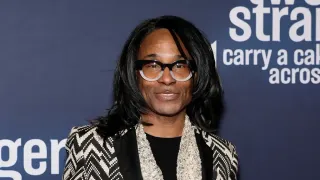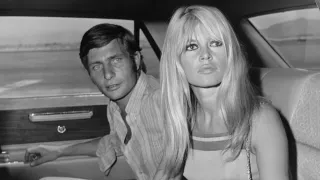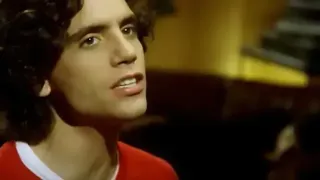September 13, 2022
Review: Henry Fry's 'First Time for Everything' a Hilarious Story of Achieving Authenticity
Brian Bromberger READ TIME: 5 MIN.
In the epigraph for his debut novel, Henry Fry quotes English writer and LGBTQ activist Alexander Leon: "Queer people don't grow up as ourselves, we grow up playing a version of ourselves that sacrifices authenticity to minimize humiliation and prejudices. The massive task of our adult lives is to unpick which parts of ourselves are truly us & which parts we've created to protect us."
In "First Time for Everything," Fry creates a protagonist, 27-year-old Danny Scudd, who embodies the journey Leon so aptly chronicles.
It is often noted that in our contemporary society, adolescence has been delayed or extended, with 25 being the new 18. This is a predicament truer for queer folks, who have to figure out how they fit into a heteronormative world often ambivalent about them and vice versa. It's really about creating an identity after being forced to be chameleons playing parts that aren't emotionally healthy. As Danny reveals, the quest for an authentic self can be bumpy, messy, but also exhilarating.
Superficially, Danny's life appears to be flourishing, living the contemporary urban gay lifestyle. He's escaped the small-town provincial life of his parents' fish-and-chips shop, relocating to London, and fulfilling his dream as a journalist, writing for a start-up clickbait cultural app called CULTRD. He has a six-year relationship with his spouse Tobbs, lives in an apartment with his high school friend Laura and her boyfriend Luke, and has a close bond with his hometown Whistlecombe BFF Jacob, a black flamboyant, non-binary avant-garde artist.
Yet within the first five pages, his perfect life has collapsed.
He's diagnosed with a sexually transmitted disease leaving him with boggy balls, given to him by Tobbs, despite assuming they had a monogamous relationship. The pretentious, unaffectionate Tobbs finding Danny too intense, leaves him, declaring as he exits, "Monogamy is a heteronormative paradigm steeped in misogyny, designed to control. As queers, we get to define our own relationships."
Life unraveling
Because Laura is pregnant and needs his room for a nursery, Dann's kicked out of his flat. He's dissatisfied with his job, wanting to be a serious journalist. He's forced to move into Jacob's creative queer commune in East London shared with other bohemian artists (i.e. Melania. She/her. Yes I'm Slovenian and beautiful. No, I'm not a hooker or a spy or married to a revolting orange cretin.") who will eventually morph into family. Only his Dolly Parton vinyl records ("as Dolly says, if you want a rainbow, you gotta put up with the rain") and houseplants give him any succor.
With his life unraveling, Danny starts to question everything about himself, struggling to figure out who he is and what the future might hold for him. But first he totally falls apart in a breakdown and only with the help of an inscrutable therapist and his new friends, can he pull himself together to forge a new path for himself.
His journey will be rocky, leading to laughable, occasionally cringey hookups (" 'What, you're not into scat play?' I look at him quizzically, 'Like – jazz?' "), wild wardrobe choices, and becoming a sensational meme after falling asleep at a gay rights die-in for Chechnya, leading to internet fame for his company. Consequently, he's promoted at work after getting his boss fired for having sex with a co-worker at the office.
There are many things he will get wrong, hurting other people and himself, yet those who care for him will stand by him. Danny's evolution is colorful and never boring because he's so relatable, with readers willing to forgive his missteps, as he decides to live a life, not hide from it.
Likable Jerk
Danny's most fascinating relationship is with Jacob, who, because of his outrageous in-your-face personality, is the star no matter where he goes. Danny had been content to remain in Jacob's shadow, but no longer wants to disappear in the background and remain invisible, which will strain his friendship. What they come to realize is how scarred they both were growing up in Whitscombe – but differently, with Jacob having to cope with racism and gender identity issues.
Danny is likable even when he's acting like a jerk. And all queer people will connect with Danny's struggle as he eases into a shaky self-acceptance.
What Fry does particularly well is to show how toxic ways adapted to unlearn negative feelings inflicted by a homophobic society must be unlearned, but also, how queer people can foist subcultural identities upon other LGBTQs that can be as oppressive as any straitjackets imposed by heterosexuals.
"First Time for Everything" could've been heavy and dark, especially since it deals with such ponderous subjects as rage, mental illness, addiction, STDs, and, yes, the therapy sessions, which sometimes read like case histories. However, the novel is fast-paced, entertaining, and often hilarious, with an effervescent quality that remains brutally honest. To maintain such a precarious balance in tone is a stupendous achievement for a first novel.
Fry conveys, in an endearing fashion, that no one should feel uncomfortable discovering truths about themselves, however unpleasant those revelations might be. Figuring out or creating a unique identity can be an arduous task, yet it can have its fun, joyful, and pleasurable moments.
Fry discloses how queer folk pretend to be someone else as survival mechanisms, and the search for authenticity can lead down some treacherous paths as they find themselves. Through Danny he counsels patience and compassion because it can be a long process, but the results can be rewarding and transformative, allowing people to become someone of whom they can be proud.
"First Time for Everything" is the ideal gift to someone coming out or struggling to belong or fit into the world in their 20s, but ultimately it speaks to anybody trying to figure out who they are meant to be, at any age. We can hardly wait for Fry's second novel, as will anyone reading this tantalizing queer coming-of-adulthood saga.
"First Time for Everything: a Novel," by Henry Fry, is available from Ballantine Books. $27.00.
Help keep the Bay Area Reporter going in these tough times. To support local, independent, LGBTQ journalism, consider becoming a BAR member.






